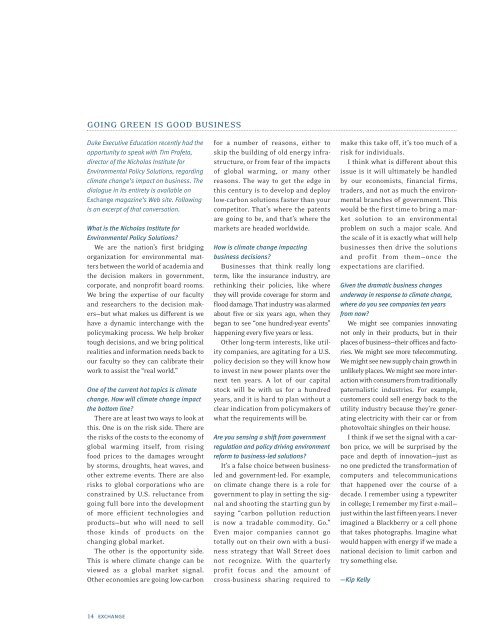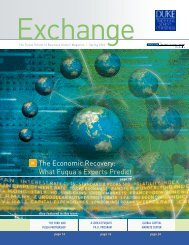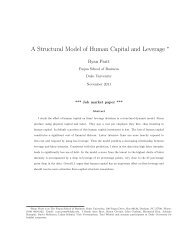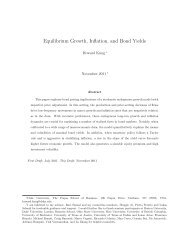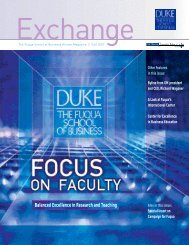Douglas T. Breeden - Duke University's Fuqua School of Business
Douglas T. Breeden - Duke University's Fuqua School of Business
Douglas T. Breeden - Duke University's Fuqua School of Business
You also want an ePaper? Increase the reach of your titles
YUMPU automatically turns print PDFs into web optimized ePapers that Google loves.
going green is good business<br />
<strong>Duke</strong> Executive Education recently had the<br />
opportunity to speak with Tim Pr<strong>of</strong>eta,<br />
director <strong>of</strong> the Nicholas Institute for<br />
Environmental Policy Solutions, regarding<br />
climate change’s impact on business. The<br />
dialogue in its entirety is available on<br />
Exchange magazine’s Web site . Following<br />
is an excerpt <strong>of</strong> that conversation.<br />
What is the Nicholas Institute for<br />
Environmental Policy Solutions?<br />
We are the nation’s first bridging<br />
organization for environmental matters<br />
between the world <strong>of</strong> academia and<br />
the decision makers in government,<br />
corporate, and nonpr<strong>of</strong>it board rooms.<br />
We bring the expertise <strong>of</strong> our faculty<br />
and researchers to the decision makers—but<br />
what makes us different is we<br />
have a dynamic interchange with the<br />
policymaking process. We help broker<br />
tough decisions, and we bring political<br />
realities and information needs back to<br />
our faculty so they can calibrate their<br />
work to assist the “real world.”<br />
One <strong>of</strong> the current hot topics is climate<br />
change. How will climate change impact<br />
the bottom line?<br />
There are at least two ways to look at<br />
this. One is on the risk side. There are<br />
the risks <strong>of</strong> the costs to the economy <strong>of</strong><br />
global warming itself, from rising<br />
food prices to the damages wrought<br />
by storms, droughts, heat waves, and<br />
other extreme events. There are also<br />
risks to global corporations who are<br />
constrained by U.S. reluctance from<br />
going full bore into the development<br />
<strong>of</strong> more efficient technologies and<br />
products—but who will need to sell<br />
those kinds <strong>of</strong> products on the<br />
changing global market.<br />
The other is the opportunity side.<br />
This is where climate change can be<br />
viewed as a global market signal.<br />
Other economies are going low-carbon<br />
14 exchange<br />
for a number <strong>of</strong> reasons, either to<br />
skip the building <strong>of</strong> old energy infrastructure,<br />
or from fear <strong>of</strong> the impacts<br />
<strong>of</strong> global warming, or many other<br />
reasons. The way to get the edge in<br />
this century is to develop and deploy<br />
low-carbon solutions faster than your<br />
competitor. That’s where the patents<br />
are going to be, and that’s where the<br />
markets are headed worldwide.<br />
How is climate change impacting<br />
business decisions?<br />
<strong>Business</strong>es that think really long<br />
term, like the insurance industry, are<br />
rethinking their policies, like where<br />
they will provide coverage for storm and<br />
flood damage. That industry was alarmed<br />
about five or six years ago, when they<br />
began to see “one hundred-year events”<br />
happening every five years or less.<br />
Other long-term interests, like utility<br />
companies, are agitating for a U.S.<br />
policy decision so they will know how<br />
to invest in new power plants over the<br />
next ten years. A lot <strong>of</strong> our capital<br />
stock will be with us for a hundred<br />
years, and it is hard to plan without a<br />
clear indication from policymakers <strong>of</strong><br />
what the requirements will be.<br />
Are you sensing a shift from government<br />
regulation and policy driving environment<br />
reform to business-led solutions?<br />
It’s a false choice between businessled<br />
and government-led. For example,<br />
on climate change there is a role for<br />
government to play in setting the signal<br />
and shooting the starting gun by<br />
saying “carbon pollution reduction<br />
is now a tradable commodity. Go.”<br />
Even major companies cannot go<br />
totally out on their own with a business<br />
strategy that Wall Street does<br />
not recognize. With the quarterly<br />
pr<strong>of</strong>it focus and the amount <strong>of</strong><br />
cross-business sharing required to<br />
make this take <strong>of</strong>f, it’s too much <strong>of</strong> a<br />
risk for individuals.<br />
I think what is different about this<br />
issue is it will ultimately be handled<br />
by our economists, financial firms,<br />
traders, and not as much the environmental<br />
branches <strong>of</strong> government. This<br />
would be the first time to bring a market<br />
solution to an environmental<br />
problem on such a major scale. And<br />
the scale <strong>of</strong> it is exactly what will help<br />
businesses then drive the solutions<br />
and pr<strong>of</strong>it from them—once the<br />
expectations are clarified.<br />
Given the dramatic business changes<br />
underway in response to climate change,<br />
where do you see companies ten years<br />
from now?<br />
We might see companies innovating<br />
not only in their products, but in their<br />
places <strong>of</strong> business—their <strong>of</strong>fices and factories.<br />
We might see more telecommuting.<br />
We might see new supply chain growth in<br />
unlikely places. We might see more interaction<br />
with consumers from traditionally<br />
paternalistic industries. For example,<br />
customers could sell energy back to the<br />
utility industry because they’re generating<br />
electricity with their car or from<br />
photovoltaic shingles on their house.<br />
I think if we set the signal with a carbon<br />
price, we will be surprised by the<br />
pace and depth <strong>of</strong> innovation—just as<br />
no one predicted the transformation <strong>of</strong><br />
computers and telecommunications<br />
that happened over the course <strong>of</strong> a<br />
decade. I remember using a typewriter<br />
in college; I remember my first e-mail—<br />
just within the last fifteen years. I never<br />
imagined a Blackberry or a cell phone<br />
that takes photographs. Imagine what<br />
would happen with energy if we made a<br />
national decision to limit carbon and<br />
try something else.<br />
—Kip Kelly


